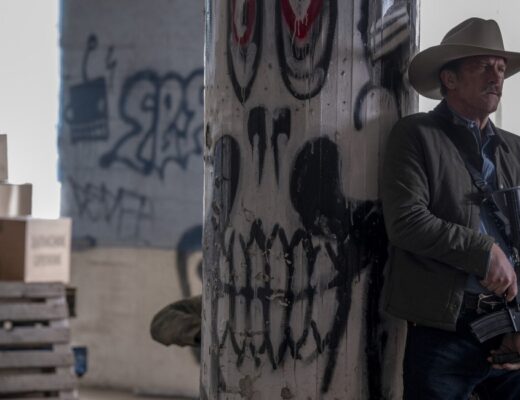The Righteous is a compelling forgery, often beautiful to look at but not nearly as profound as it believes itself to be.
The Righteous, the debut feature from actor Mark O’Brien, is the type of film that practically begs to be viewed as respectable, serious-minded fare, seen in everything from its austere black-and-white photography to its thematic focus on a crisis of faith. Press materials make bold comparisons to the likes of Ingmar Bergman and Charles Laughton — audacious propaganda for even an established director, let alone a debut — setting viewers up for disappointment long before the first frame unfurls. Taken on its own merits, The Righteous should be lauded for its lofty ambitions; those expecting a modern-day classic in the vein of Diary of a Country Priest or Night of the Hunter, however, would be wise to look elsewhere (seriously, why?). In fact, the film’s philosophical ruminations on guilt and spirituality more readily call to mind Paul Schrader’s First Reformed, but establishing that comparison isn’t all that much kind to The Righteous.
Henry Czerny stars as Frederic Mason, a former priest who, as the film opens, is dealing with the loss of his 12-year-old adopted daughter, the victim of a hit-and-run. Frederic lives in the middle of nowhere with his grieving wife, Ethel (Mimi Kuzyk), with each day proving an endurance test of pain and guilt. But into the lives of these two troubled souls enters a stranger, Aaron Smith (Mark O’Brien), a good-looking yet mysterious chap who emerges from the woods one night seeking shelter and treatment for a sprained ankle. While ultimately welcomed in by the Masons, questions of identity and intent linger, with Frederic especially troubled as revelations lead only to more suspicions. This also leads to the film’s biggest stumbling block, namely that the actions of the characters make little to no sense at any given moment, jerked around by the script in the name of convenience. It would be easy to understand Aaron’s presence as a balm or at least a welcome distraction for the grieving couple, his arrival nearly serendipitous as Frederic and Ethel desperately try to fill the void left by the loss of their daughter. But such an angle is never teased out, as Aaron comes across as archly sinister from his first appearance, to the point that Frederic’s aid seems downright stupid. It is also rather telling that Ethel’s acceptance of this stranger is brushed off with an explanation of “We talked for hours last night,” as if O’Brien was desperate to paper over the gaping plot hole at the film’s center.
That’s not to suggest that plot mechanics are the focus of The Righteous, as O’Brien is far more interested in the effect that Aaron’s appearance ultimately causes in Frederic, a man running from a mysterious and troubled past, his day of spiritual reckoning finally within reach: “Be careful what you wish for, but be certain what you pray for,” a local priest solemnly intones to Frederic as he seeks spiritual guidance. Indeed, there’s no shortage of questions raised by The Righteous in regards to religious atonement. Is payment for past mistakes ever truly possible? Can one sin simply cancel out another? Why is the pain we deserve — even crave — seemingly inflicted upon the innocent, loved ones caught in the crossfire of a faith crisis? It all leads to an ending that is nearly apocalyptic in what it implies regarding such questions, one likely to garner as many champions as it does detractors.
O’Brien certainly gets points for mounting a film that interrogates spirituality in a thoughtful and meaningful way, especially when the empty-headed likes of God’s Not Dead clog theaters across the country, but The Righteous is the kind of film that isn’t half as deep as it thinks it is, trading on empty posturing for most of its runtime, its bold ending feeling like another calculated move intended only to maximize shock value. It doesn’t help that Czerny, a character actor who has appeared in various films and television projects for the past 30 years, doesn’t have the dramatic chops to pull off the emotionally-nuanced performance necessary to make this material work. He scans as more testy than haunted, which becomes grating before long, but at least he looks the part of an anguished soul, which is appropriate for a film that is nothing but surface, even as it supposedly plumbs the depths of humanity. To that end, the black-and-white photography is undeniably gorgeous, but the image itself looks somehow too crisp, its digital roots impossible to disguise by O’Brien and at odds with the messy inquiries the film is built upon. Ultimately, that’s The Righteous in a nutshell: a compelling forgery, and one whose aspirations for profundity are far too visible.
You can stream Mark O’Brien’s The Righteous on Arrow beginning on June 10.
Originally published as part of Fantasia Fest 2021 — Dispatch 5.







